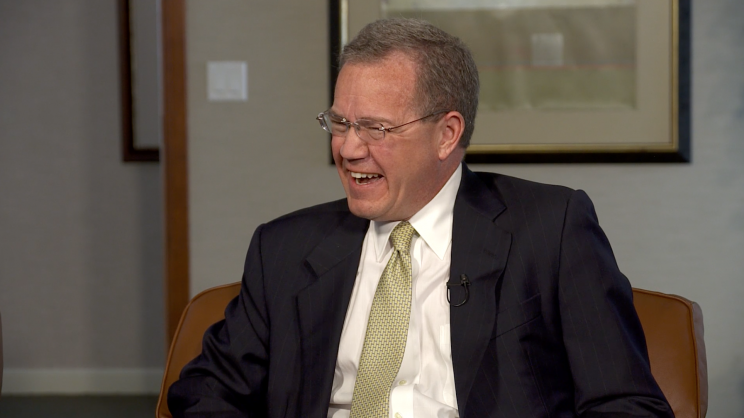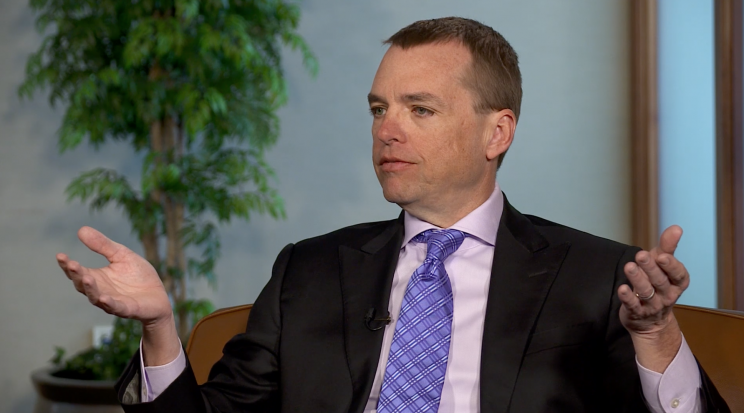EXCLUSIVE: Warren Buffett's money managers, Todd Combs and Ted Weschler, speak
Could we look back someday and say that Warren Buffett’s greatest genius was finding amazingly talented people to replace him?
Berkshire Hathaway (BRK-A, BRK-B) investors certainly hope so.
Buffett, 86, hasn’t been shy about acknowledging his own mortality and that at some point others will be running his money-making machine of a company. And while Buffett hasn’t named a successor as of yet, he has tabbed a pair of money managers, Todd Combs (in 2010) and Ted Weschler (in 2011), to begin to take over the key investment operations of Berkshire.
I recently sat down with Buffett, Combs and Weschler in Omaha for a rare three-way interview. What emerges is that Combs and Weschler are actually a whole lot like Buffett and his partner Charlie Munger.
Of course, that’s hardly a coincidence. Buffett and Munger were looking for as close to clones as they could find—at least in terms of investing prowess. Both Combs and Weschler are understated, super-smart and spend most of their days doing the same thing Buffett and Munger do, with their noses in documents.
How Todd and Ted caught Warren’s attention
“These are the only two guys we could find that read as much as we did,” Buffett says with a laugh.
Actually Buffett’s not really kidding.

People may be curious how Todd Combs (pronounced like “combs his hair”) and Ted Weschler (pronounced “weshler”) got what most would consider to be the most plumb jobs in investment business.
Let’s start with Combs and let him tell us how he landed the job:
“I met Warren through Charlie. I called Charlie up just randomly. I had always wanted to meet him. And we hit it off,” Combs says. “We had breakfast for three or four hours. And luckily he called me a couple weeks later, and we continued discussions. And this kinda went back and forth for a couple months.”
Combs added: “And at one point in time, I was out having breakfast or lunch with him, and he said, ‘You know, you should really meet Warren.’ And he then, in true Charlie and Berkshire style, tried to convince me why this was necessary, and how much I would enjoy it and so forth. So I called Warren up. And flew to Omaha, and we met. So that’s how that happened.”
Easy peasy, right?
As for Weschler, well he had to cough up $5,252,722 to get the job. Seriously! Here’s that story: Back in 2010 an anonymous bidder paid $2,626,311 in a charity auction to have lunch with Buffett. And then the following year a bidder won the lunch by upping the bid by $100, to $2,626,411.
Turns out the winning bidder in both years was Weschler, then running his highly successful hedge fund, Peninsula, out of Charlottesville, Virginia. Buffett was so impressed with Weschler that he offered him a job.

So what are Buffett’s two money managers like? Well both Combs, 46, and Weschler, 56, appear to be calm, thoughtful and friendly. And they’re both in great shape. Combs plays tennis and Weschler runs almost every day. Buffett suggested the two would whip me in the upcoming Berkshire 5k coming up in Omaha on May 7, the day after the annual meeting—and I bet he’s right.
And of course Berkshire shareholders should love the fact they they’re both decades younger than Buffett and Munger. That means if they’re successful they will be doing their jobs for many, many years.
Lots of the time to read at work
I was very curious to find out what it was like to work for Buffett. I asked Weschler first.
“It’s terrific. In many ways, it doesn’t change much from my prior world, where I ran a fund,” Weschler says. “I’ve always been kind of a one man band, analytically. I spend the vast majority of my day reading. I try to make about half of that reading random. Things like newspapers and trade periodicals.”
(See below for Todd and Ted’s reading list.)*
Weschler added that it’s remarkable “to be able to [work] in an environment like Berkshire, and be able to learn by osmosis and compare notes with Warren. We get together for lunch every Monday, the three of us, and Tracy [Britt Cool, another top exec at Berkshire], if she’s in town she’ll join us.”
Weschler says the group talks about the culture at Berkshire and the events that have transpired during Buffett’s career.
“It’s very special. I first was introduced to Warren (not physically) through a friend of mine in 1979 who said, ‘There’s this guy out in Omaha that when he writes, you really should read what he writes ’cause it’s got a certain clarity to it,’” he said. “And I started reading [Buffett’s shareholder letters etc.] and I’ve read over the years, just about everything, I think, Warren’s put out there. To have that as a backdrop, and then to come to the organization and be able to interact on a regular basis, it’s terrific. It’s fun.”
Of course I had to ask Buffett how he picked these two out of the hordes who wanted the job.
“Well, they’re chosen for both ability and character,” Buffett tells me. “For a very long time investments were handled by just me and Charlie Munger. And then maybe seven or eight years ago, Charlie and I talked about the desirability of bringing on somebody or maybe more than one somebody to both manage money now, but also in preparation for the day that Charlie and I won’t be around.
“And I remember when I flew to Korea one time, I think I took 600 or so letters I’d received from people. And it wasn’t just a matter of looking at past records or anything of the sort. I mean there are all kinds of past records that really don’t mean much. But it’s how they put together that sorta thing, and then it’s the kind of person they are.
“Having anybody join the Berkshire family and be an integral part of investing significant money, you know, that’s a big responsibility. And I wanted somebody who was gonna be there for keeps. And I first found Todd six or seven years ago, and Ted five or so years ago. And now we’re all set. And they’re handling $10 billion each. When we started, it was maybe $2 billion or so. Now I’ve added capital to it. It’s one of the best decisions that Charlie and I have ever made, was bringing these two on board.”

I ask Combs what his day is like.
“I get in around 7 or 8, and I read until about 7 or 8 at night,” he says with a laugh. “And I go home, and see my family, and then I’ll read for another hour or two in bed at night. And you know, there might only be three to four phone calls the entire week. So there are very, very few interruptions. I have a great assistant who knows everything that I read, and she kinda provides everything, and there’s a back and forth between us where I’ll mark it up, and give it back to her. And we have a system for filing and so forth. But it’s literally just reading about 12 hours a day of everything I just mentioned.”
“Charlie describes himself as a book with legs,” says Buffett after hearing that.
So how’s this going to play out? I asked Buffett if he had a formal plan in place to turn things over to Combs and Buffett.
“We don’t have a formal plan,” Buffett says. “But it’s clear where we’re going. There’s a lotta money to invest at Berkshire. Our number one hope is that we find operating businesses to invest in. But we’ll always have a ton of marketable securities. And we’ll probably have a fair amount of cash at all times, too.”
“But ideally, we would have less cash than we have now. Because I’d rather own a business than own Treasury bills. [In terms of Combs and Weschler taking over] it’s gonna be evolutionary,” Buffett adds. “But they will be helping the next CEO in a very, very, very big way. Not only in terms of handling marketable securities, but just in evaluating acquisition. They understand businesses.”
Berkshire shareholders hope that’s the case. No doubt they will find out.
——
Yahoo Finance will host the exclusive live stream of Berkshire Hathaway’s shareholder meeting on May 6, 2017.
*Ted Weschler’s reading list:
“Handelsblatt has a very good English version. I started reading that a couple years ago. The Financial Times gives you a slightly different view on the world the U.S. In the U.S., The New York Times and Wall Street Journal. I always read the local paper of the city that I wake up in each day. I still read the U.S.A. Today every day. It just kinda does a different job of telling you where things resonate with the non-financial crowd. And I like to see where article placements are in the U.S.A. Today versus New York Times.”
*And Todd’s list:
“Well it runs the gamut as well. I would say certainly newspapers. I follow about 250 public companies every quarter. And so I go through, for each quarter each one of those companies, their quarterly reports. So a lot of S.E.C. filings. A lotta transcripts. I can read a transcript much faster than I can listen to the conference call. And you weed out some of the friction there as well.
“So a lot of S.E.C. filings. A lotta trade magazines. There are a couple dozen of those that I subscribe to. And then I have a wonderful analyst who helps me with channel checks where we talk to customers, suppliers, ex-employees and so forth. We’re really trying to get a view of what it would be like—every security that we look at, we’re really trying to get a sense of what it would be like to own the entire business.”
Andy Serwer is editor-in-chief of Yahoo Finance.
More about Warren Buffett and Berkshire Hathaway:
Yale slammed Warren Buffett’s favorite investing advice, but still endorsed it
Why Warren Buffett’s face is all over China’s Cherry Coke
Meet the West Virginia steelworker who won $10,000 in Warren Buffett’s March Madness contest
